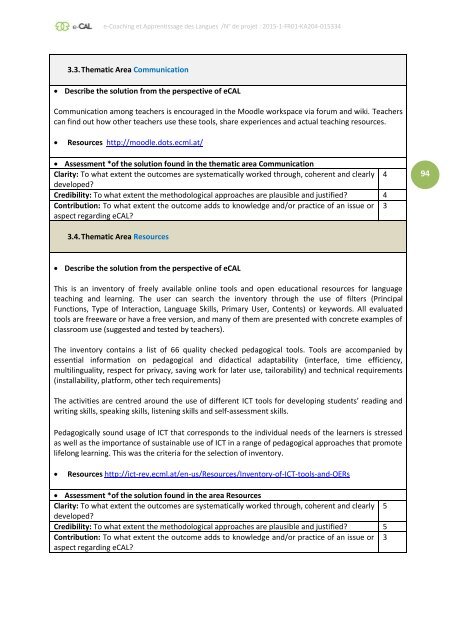e-CAL - e-Coaching et Apprentissage des Langues
The ERASMUS+ project e-CAL presents the result of an analysis of support methods in the case of language learning using web-based Open Educational Resources (OER).
The ERASMUS+ project e-CAL presents the result of an analysis of support methods in the case of language learning using web-based Open Educational Resources (OER).
Create successful ePaper yourself
Turn your PDF publications into a flip-book with our unique Google optimized e-Paper software.
e-<strong>Coaching</strong> <strong>et</strong> <strong>Apprentissage</strong> <strong>des</strong> <strong>Langues</strong> /N° de proj<strong>et</strong> : 2015-1-FR01-KA204-015334<br />
3.3. Thematic Area Communication<br />
Describe the solution from the perspective of e<strong>CAL</strong><br />
Communication among teachers is encouraged in the Moodle workspace via forum and wiki. Teachers<br />
can find out how other teachers use these tools, share experiences and actual teaching resources.<br />
<br />
Resources http://moodle.dots.ecml.at/<br />
Assessment *of the solution found in the thematic area Communication<br />
Clarity: To what extent the outcomes are systematically worked through, coherent and clearly 4<br />
developed?<br />
Credibility: To what extent the m<strong>et</strong>hodological approaches are plausible and justified? 4<br />
Contribution: To what extent the outcome adds to knowledge and/or practice of an issue or 3<br />
aspect regarding e<strong>CAL</strong>?<br />
94<br />
3.4. Thematic Area Resources<br />
Describe the solution from the perspective of e<strong>CAL</strong><br />
This is an inventory of freely available online tools and open educational resources for language<br />
teaching and learning. The user can search the inventory through the use of filters (Principal<br />
Functions, Type of Interaction, Language Skills, Primary User, Contents) or keywords. All evaluated<br />
tools are freeware or have a free version, and many of them are presented with concr<strong>et</strong>e examples of<br />
classroom use (suggested and tested by teachers).<br />
The inventory contains a list of 66 quality checked pedagogical tools. Tools are accompanied by<br />
essential information on pedagogical and didactical adaptability (interface, time efficiency,<br />
multilinguality, respect for privacy, saving work for later use, tailorability) and technical requirements<br />
(installability, platform, other tech requirements)<br />
The activities are centred around the use of different ICT tools for developing students’ reading and<br />
writing skills, speaking skills, listening skills and self-assessment skills.<br />
Pedagogically sound usage of ICT that corresponds to the individual needs of the learners is stressed<br />
as well as the importance of sustainable use of ICT in a range of pedagogical approaches that promote<br />
lifelong learning. This was the criteria for the selection of inventory.<br />
<br />
Resources http://ict-rev.ecml.at/en-us/Resources/Inventory-of-ICT-tools-and-OERs<br />
Assessment *of the solution found in the area Resources<br />
Clarity: To what extent the outcomes are systematically worked through, coherent and clearly 5<br />
developed?<br />
Credibility: To what extent the m<strong>et</strong>hodological approaches are plausible and justified? 5<br />
Contribution: To what extent the outcome adds to knowledge and/or practice of an issue or 3<br />
aspect regarding e<strong>CAL</strong>?


